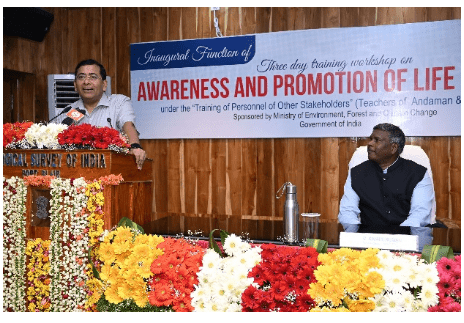Sri Vijaya Puram: The Zoological Survey of India’s Andaman & Nicobar Regional Centre has launched a three-day training workshop aimed at strengthening environmental education through schoolteachers. The workshop, which began today at the ZSI Auditorium in Sri Vijaya Puram, is focused on awareness and promotion of biodiversity-related activities and is part of the Ministry of Environment, Forest and Climate Change’s national initiative to train non-specialist stakeholders in environmental outreach.
With participation from 27 teachers representing 15 schools across South Andaman, the workshop blends technical sessions with field visits and seeks to empower educators with the tools to integrate marine and terrestrial biodiversity knowledge into their classrooms. The training is being conducted under the scheme ‘Training of Personnel of Other Stakeholders,’ and is structured around both lectures and site visits to local ecological hotspots.
The program was inaugurated by the Chief Secretary of the Andaman & Nicobar Administration, Chandra Bhushan Kumar, who commended ZSI for regularly hosting such workshops for the teaching community. In his address, he emphasized the need for an inclusive and technologically enabled environmental education framework, particularly in the context of remote island systems. The Chief Secretary highlighted the importance of ensuring that teachers from even the most distant parts of the Islands are involved in such initiatives, leveraging online platforms to close logistical gaps.
Drawing attention to the need for stronger institutional alignment, the Chief Secretary proposed the creation of a calendar of biodiversity activities that could be shared with the Education Department, enabling schools to systematically weave environmental content into their annual schedules. He also advocated for the inclusion of senior school students, particularly those in Classes IX and XI, as participants in these initiatives, citing their capacity for critical thinking and community leadership.
As an example of grassroots environmental change, the Chief Secretary recounted a case from Maharashtra, where a single individual transformed barren land into a thriving forest ecosystem. He also suggested the development of micro-content, such as short educational videos and printable booklets, which could be shared via smartphones for maximum reach.
Other suggestions included encouraging students and educators to observe local ecological phenomena, like changes in flowering and fruiting patterns of mango trees, as early indicators of climate shifts. He also reiterated the importance of cross-institutional collaboration, urging research organisations to work closely with the Education Department in developing accessible, context-specific learning material.
The workshop commenced with a welcome note from Dr. C. Sivaperuman, Officer-in-Charge of ZSI and the course director, who provided an overview of the sessions and objectives. Over the three days, participants will engage in technical lectures on island biodiversity, climate change indicators, endemic fauna, and conservation strategies. A field visit to the intertidal zones of Burmanallah and Chidiyatappu Biological Park has also been scheduled, allowing teachers to witness firsthand the ecological diversity of their region.
By equipping teachers with up-to-date scientific knowledge and exposure, the workshop aims to create a ripple effect in classrooms and communities. In a fragile island ecosystem like Andaman, where biodiversity is rich yet vulnerable, building local awareness through education is seen as a cornerstone of long-term conservation.
The event underscores a growing shift toward capacity-building at the grassroots level, one that blends traditional education with ecological insight and encourages teachers to become advocates for the environment. As the workshop progresses, the focus will remain on actionable ideas, accessible tools, and long-term collaboration between scientists, educators, and local institutions.





